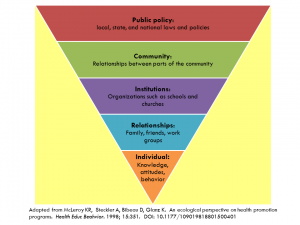By Emily Sullivan, University of Massachusetts Lowell
Image credit: http://allthingsd.com/files/2012/12/mind-the-gap.jpg
As an up and coming discipline, Community Psychology has made its mark both in the applied field setting as well as through empirical research endeavors. However, there exists a clear divide between academic community psychologists and their practicing colleagues. In a field that focuses on bringing about positive change and strengthening communities, it appears as though the fundamental principles of this field have not been applied to those who practice it.
Academics in this field established their power early in the development of Community Psychology. It was extremely important to progress this field with a strong research base to create a legitimate and respected reputation. Therefore, practicing community psychologists were not taken into considerationand drastically underrepresented members of the field during many conferences and trainings; on one specific occasion they weren’t even invited (Scott & Wolfe, 2015, p. 9)! Practicing Community Psychologists were not only invisible within their discipline but to the outside world as well. The label “Community Psychologist” was not used for practitioners, though their skill sets and education was one that filled this title. Therefore, peers and clients would not recognize practitioners as such, further hiding these applied community psychologists (Scott & Wolfe, 2015, p.11). It is quite a paradox; individuals who work hard towards empowerment, strength and change within communities remained invisible, weak and disconnected within their field.
In recent years, with the growing popularity of Community Psychology as a discipline, practitioners were able to uncover niches within new settings which allowed them to more visibly apply the fundamentals of this field (Scott & Wolfe, 2015, p. 11). Also through developing a clear definition of community psychology practice and competencies by which to become a practitioner the once strained relationship between practitioners and academics was beginning to mend itself (Scott & Wolfe, 2015, p.20). Although this relationship has improved and both parties appear to have more equated value and stake within the field of community psychology, it is reasonable to assume that more work still needs to be done.
The ever obvious difference between practitioners and academics is not only shown in how they contribute towards the field, but their perception of community psychology as a whole. It is understandable to assume that based on sheer differences in the types of roles you fill within a field, a gap between these roles will be created. Perhaps a phenomenon often discussed in the context of Clinical Psychology, egocentrism, could help explain and support this theory. “An egocentric bias occurs when one thinks of the world from one’s own point of view and self perceptiontoo much (“Self Perception,” para. 1).” Perhapsan already damaged relationship has been further strained by the presence of egocentric bias towards individual work, on behalf of both academic and practice Community Psychologists. It would be beneficial for both groups to play more of a role in each other’sspecialty, after all both academics and practitioners contribute greatly to the success of Community Psychology. Through collaboration, an appreciation for each other’s work could be achieved and the cycle of egocentric thought could be broken. There is more success found by working together than separately. Perhaps though the utilization of the principles of Community Psychology the “community” comprised of practitioners and academics can be strengthened and empowered as a single unit.
How each group perceives the field of Community Psychology also plays a large role in the divide between these groups. Academics focus more on their empirical research, while practitioners actively apply the fundamentals of Community Psychology within the communities they aim to serve; of course there is a disconnect between them. How can academics provide strong empirical evidence for practices which they do not regularly experience? It seems like an impossible feat. Alternately, how can practitioners hope to apply research which can be disconnected from the specific community which they serve? This gap is only hindering the advancements and successes of Community Psychology. It is important for both groups to actively engage with one another and involve each other in specific projects or experiences. Active involvement will help make research and interventions more effective and tailored towards a specific communities. In terms of Community Psychology, it is important that we mind the gap between academics and practitioners, but also strive to close it.
#commpsych
Emily Sullivan is a graduate student in the Autism Studies program at the University of Massachusetts.
References
Self Perception – Thinking From Your Point of View. (n.d.). Retrieved September 4, 2015, from: http://www.psychologycampus.com/social-psychology/self-perception.html
Scott, C. V, & Wolfe, M. S. (2015) Community Psychology Foundations For Practice. Thousand Oaks, California: SAGE Publications, Inc.


